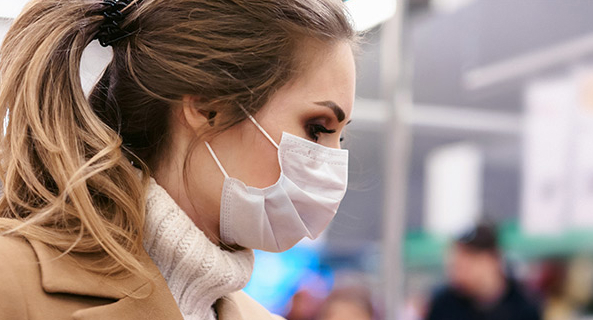Disposable or Reuseable Face Masks?
Face masks have always been an effective form of protection against transmissible diseases. They act as a physical barrier, helping to minimise the spread of airborne viruses such as COVID-19.
Since the start of the global COVID-19 pandemic, face masks have become a part of everyday life. But with different options available, it can be difficult to know which mask will suit your needs best.

Reusable face masks
Reusable masks are made from a variety of materials, both synthetic and natural. Cloth face coverings are generally made from multiple layers of lightweight, breathable fabric. The Australian Government’s Department of Health recommends reusable masks be made with a minimum of two layers.
Cloth masks are ideal for low-risk community environments as they’re affordable, washable and help to preserve medical grade surgical masks for use in healthcare settings or by those who are at higher risk. However, reusable face masks are often poorly fitted as they don’t sit flush against the skin leaving wearers susceptible to viral transmission. While there’s still limited evidence for protection with cloth masks, they’re still considered an important step in minimising the spread of COVID-19, along with physical distancing and good personal hygiene.
Disposable Face Masks
As the name suggests, disposable face masks are intended to be disposed of after use. There are a variety of disposable masks available that provide different levels of protection, including surgical or medical masks, N95, KN95 or P2 respirators masks.
Respirator masks like D95 P2 respirators and N95 surgical respirator masks are designed to filter the air when it’s inhaled by the wearer to remove small airborne particles. These masks must be fitted correctly to offer effective protection. Also known as donning (applying) and doffing (removing), SA Health has released specific instructions on how to correctly fit and remove respirator masks.

Surgical or medical masks offer droplet protection and are ideal for both community use and for healthcare workers in lower risk environments. These masks are readily available and offer different levels of splash resistance protection.
Respirator masks and surgical masks must be disposed of correctly to avoid self-contamination. Always wash hands with soap and water or hand sanitiser before and after handling your mask. Remove the mask using the ear bands or loops to avoid touching the front of the mask and place in the bin. Once you’ve disposed of your mask, wash or sanitise your hands again thoroughly.
Although face masks are considered ‘non-recyclable’ items by traditional kerbside recycling, there are a number of waste management initiatives currently being rolled out across Australia to combat face mask waste. TerraCycle’s Face Mask Zero Waste Box is just one example of encouraging the wider community to recycle disposable face masks, including surgical and respirator masks. The face mask waste is processed to create recycled materials for use in products like outdoor furniture and decking.

When Should I Wear One and Not the Other?
Respirator masks like D95 P2 respirators and N95 surgical respirators offer the highest level protection against airborne transmission when worn and fitted correctly. They’re typically worn by healthcare workers or those that are at higher risk along with other PPE like protective eyewear, gloves, gowns, etc.
Medical-grade masks, also known as surgical masks, are designed to provide droplet protection. They also provide good source protection by helping to reduce the spread of large respiratory droplets. These masks are often worn by healthcare workers when they’re not exposed to high-risk transmission and are also appropriate for community use.
Reusable cloth masks provide limited protection and source control. They’re ideal for low-risk public environment use when physical distancing isn’t possible.
How Regularly Should Reusable Masks be Cleaned?
As is the case with disposable masks, reusable masks should only be worn once before being washed. According to SA Health, cloth masks should be washed daily and changed whenever they become dirty or wet. NSW Health suggests having separate masks for different times of the day. For example, if you were commuting for work each day, you’d pack a separate mask for the journey to and from work and another if you’re out for lunch.
How to Wash a Reusable Cloth Face Mask
Whether you decide to hand wash or machine wash your mask, the important thing is to make sure you’re using hot soapy water. Use a clothes dryer or fresh air to dry your mask completely before storing it in a sealable bag for safekeeping.
How Often do I Need to Change a Disposal Face Mask?
Disposable masks should be changed every four hours or as soon as they become soiled or damaged for the greatest efficacy. It’s often worth carrying more than one mask on you so you can quickly and easily replace your disposable mask if it gets dirty.
Detmold Medical stocks a comprehensive range of different disposable face masks that have been designed in collaboration with healthcare and industry experts. Learn more about our range of face masks and respirators here.




